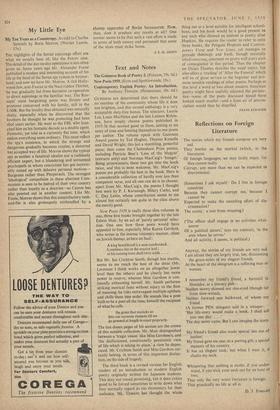Text and Notes
The Guinness Book of Poetry 2. (Putnam, 10s. 6d.) New Poets 1959. (Eyre and Spottiswoode, 18s.) Contemporary English Poetry: An Introduction. By Anthony Thwaite. (Heinemann, 10s. 6d.) GUINNESS are determined that there should be no member of the community whose life it does not brighten, and this second anthology is a very acceptable duty-free bonus. The selectors, Laurie Lee, Louis MacNeice and the late Lennox Robin- son, have simply chosen poems published in 1957-58 that seemed good to them, aiming at no unity of tone and limiting themselves to one poem per author. The volume opens with Guinness Award poems by Ted Hughes, Thomas Kinsella and David Wright, this last a stumbling, powerful piece; then come the Cheltenham Prize poems, including Patricia Beer's 'Loss of the Magyar' (extracts only) and Norman MacCaig's 'Images.' Being prizewinners d these two get into the book twice, and this is most welcome. Mr. MacCaig's poems are probably the best in the book. Here is a considerable collection of hardly ever less than competent verse, and all one can do is to choose; apart from Mr. MacCaig's, the poems I thought best were by P. J. Kavanagh, Hilary Corke, and C. Day Lewis, whose contribution seems to me almost but certainly not quite in the class above the merely good.
New Poets 1959 is really three slim volumes in one, three first books brought together by the late Edwin Muir, by an act of 'purely personal' selec- tion. One sees how these poets would have appealed to him, especially Miss Karen Gershon, who writes in the intense visionary manner, often on Jewish themes, as here on Saul :
A king bewildered is a man condemned. Loneliness lies in the evasive leaf:
at his coming trees shall twist aside . . .
But Mr. Ian Crichton Smith, though less mantic, seems to me much the best of the three (Mr. Levenson I think works on an altogether lower level then the others) and he clearly has more power in reserve, whereas Miss Gershon is con- tinually exhausting herself. Mr. Smith performs striking metrical feats without injury to the flow of meaning; he risks extravagant multiple epithets and chills them into order. He sounds like a poet built to be a poet all the time, himself the recipient of what he calls
the grace that musicks us into our accurate element till we
go gowned at length in exact propriety.
The last dozen pages of his section are the crown of this notable collection. Mr. Muir distinguished between a 'tragic vision' like Miss Gershon's, and 'the disillusioned, conditionally pessimistic view of life which is taking its place,' a view he depre- cated. Mr. Crichton Smith and Miss Gershon cer- tainly belong, in terms of this important distinc- tion, on the side of tragedy.
The third book is a revised version for English readers of an introduction to modern English poetry originally written for Japanese students. This may not sound promising, but it does critics good to be forced sometimes to write down what they normally regard as too elementary for their audience. Mr. Thwaite has thought the whole
thing out at a level suitable for intelligent school- boys, and his book would be a good present to any such who showed an interest in poetry after ,Hopkins. He requires the reader to refer to only three books, the Penguin Hopkins and Contem- porary Verse and New Lines, yet manages to provide thorough and fresh, though naturally unadventurous, comment on pretty well every poet of consequence in this period. Thus the chapter on Dylan Thomas sketches the usual topics. but also offers a 'reading' of 'After the Funeral' which will be of great service to the beginner and pro- mote sensible readings of other poems. Perhaps at this level a word or two about modern American poetry might have usefully adjusted the perspec- tive—some of the poets discussed would have looked much smaller—and a faint air of provin- cialism would thus be dispelled.
FRANK KERMODL






































 Previous page
Previous page